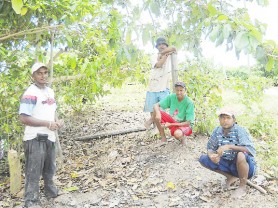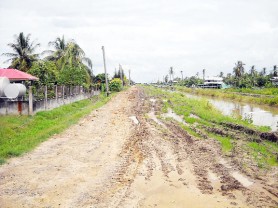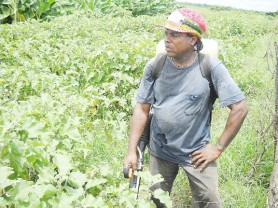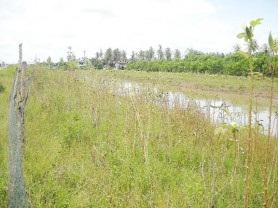-middlemen reign supreme in Black Bush Polder
(This is the fourth part in a series on the Grow More Food campaign)
Quantities of ochro and boulanger were left unpicked in Black Bush Polder fields in August. In Worrell Lewis’ farm along the road heading farther into the farming area, from over 5,000 plants, 2,000 bearing boulanger plants were left alone, waiting to be cut down.
In one of the quirks of farming, he was planning to plant more boulanger because as he explained, “you must always get… continually”. Markets are “terrible”, Lewis said. When Stabroek News spoke with him early last month, there was a boulanger glut in the market. From $4,000 per bag at the end of July, the price plummeted to $1,000 per bag. As he took a break from spraying his field, he said that sometimes they dump the crops. “The price ain’t right… before we give the middleman at that price, we prefer to dump it,” Lewis said explaining that the cost of production is high and the middlemen are the ones who make the money. “They are taking advantage of farmers,” he said. “We does put a lot into this. They don’t consider how you make your money.”
Across the premier farming community in the Corentyne area, other farmers related similar stories. “Sometimes you gat um nice, sometimes you gat um bad,” explained Sham Jhamount. From his two and a half acres’ farm at Yakusari, where he cultivates ochro, boulanger and pepper, he sells to middlemen and the price depends on the quality of the produce. “Sometimes it don’t sell. You does ga throw it away,” he said, recalling once when he threw away four “picking” (between 10 to 12 bags) of boulanger.
Kevin Dookwah who farms on one and a half acres, concurs with Jhamount’s statements.

As did Narinee Mangra. “Right now thing nah sell,” she said at her little stall at Yakusari. “Right now ochro ah $5 a pound and it nah pay foh pick.” Khumal Seenarain’s current crops are sweet pepper and ochro on two and a half acres. “You nah get good price,” he said, explaining that at the time, buyers were purchasing ochro for $5, $10 or $15 per pound. “That they paying you. That can’t pay,” he said. Sweet pepper was being purchased for $160 per pound when sometimes it can go up to $400 per pound. He said that for this crop, he left one and a half acres of ochro unpicked and planned to chop the plants down. “It happens steady,” he said. Seenarain said he had started to grow more crops because of the Grow More Food campaign in hopes of getting better prices. “But we nah gat nothing better,” he lamented.
However, Agriculture Minister Robert Persaud has said that residents can’t complain. “In recent years, I don’t think the communities of Black Bush Polder can complain and even suggest they have not been getting the type of visits and attention; and whilst we recognise that much remains to be done, I think we can count and even point to many areas of improvements,” he said during a visit there on August 18, following this newspaper’s visit. During his visit, he touted a $600 million rehabilitation scheme for the area.

The farmers had told this newspaper that they mostly sell to “middlemen”, who usually determine what price they will pay. They also highlighted the high prices for fertilizer and drugs, flooding and the pothole-filled Black Bush Polder Road.
“It is government’s commitment to ensure that agriculture is promoted in Guyana and that all farmers are satisfied,” Persaud told the farmers while encouraging them to make suggestions to the Public Works Ministry on developing a fundamental programme for road maintenance. Under the $600 million programme, the Black Bush Polder Road is to be rehabilitated. He also said the resources allocated to the area will allow for a comprehensive rehabilitation of control structures, bridges and access dams, the Government Information Agency had reported.
Persaud said that it is the administration’s aim not to only focus on production but also place emphasis on productivity to ensure that farmers benefit from the best technologies. “We just don’t want you to produce more but we want you to be modern farmers and that is why we are training you in all aspects; from production to post-harvesting because we don’t want you to be disadvantaged in one way or the other,” Persaud told the meeting.

Most of the farmers who spoke with Stabroek News only sell to the local market and long for better, stable markets. No one has ever spoken to him about growing for exports, Seenarain said. The subject has never been mentioned to him, Jhamount said.
“We’d be glad to get export market because of the price,” said Lewis, who also cultivates tomatoes and peas among other crops for the local market. He said that once the New Guyana Marketing Corporation called him and spoke about exporting but he did not hear anything further. He said that government has to help get overseas markets for farmers. However, he said, many of those markets want organic produce, which, he said, cannot be done on a large scale here because of the many insects and diseases.
Some farmers, like Hemnarine of Mibicuri, where he cultivates hot pepper and other crops on five acres, said that he sells to a middleman, who exports his pepper. He said that the exporters have standards and it is difficult to meet these. And he is not too happy about the reliability and the words of officials. “Them ah come to you, when you plant am, they nah come back. Them a tell you, plant that, market available, but you nah hear back nothing,” he said. He recalled that about two months ago, farmers were told that two containers of produce were needed to take to Aruba but they heard nothing since. “The problem is the market,” he said.

Hemnarine recalled that one of his former neighbours, who he said had one of the best farms in Black Bush Polder, but who has since migrated, took the plunge and planted hundreds of the bull-nose pepper which had been touted by the government as part of the Poor Rural Communities Support Services project. He was stuck with hundreds of pounds because no one would buy it since he did not meet certain standards, Hemnarine related. He said that the new GMC has visited farmers but “you can’t get any confidence for them. Them ah tell you to plant. When the crop deh, they nah show up”. He said that farmers would call the GMC officials on their cellular phones and sometimes, when they managed to reach them, they would be asked to call at another time and when they do, the phones would be turned off. When this was related to the minister during an interview, he said that the farmers need to be in touch with the New GMC and also pointed to a cellular service provided where farmers can send a text with the crop’s name and get the local and overseas market prices.
“Me nah tek chance with bullnose till me see the market,” Hemnarine said. “If you gat the market, it gon good,” he added, pointing out that bullnose pepper weighs less than hot pepper.
Another farmer, Bridgemohan Persaud said he planted the bullnose pepper but it did not grow because an insect, “dutty puppy”, ate it. A lot of disease affects the crops, he said. At Mibicuri, the middlemen were buying ochro at $20 per pound, he said. Persaud said he also planted rice and reared cattle.
Mangra said that she has been farming since 1961. She cultivates ochro, cabbage, boulanger, pepper and bora on two and a half acres at Yakusari and sells to middlemen. “Them a pay you what them feel like… sometimes it nah sell, sometimes it sell dear,” she said adding that farming is “in and out”. When she spoke with this newspaper in August, she was lamenting that flooding was affecting farmers and some lost crops.
They have to plant, she said. “When you don’t plant you lose.” She added that they need better prices. “When you nah gat money, how you gon plant?”
While Mangra said that she sells to the middlemen, Lewis said he goes to the market to sell sometimes. He recalled that once a Linden businessman ordered a truckload of watermelon but when he carried it to the community, the businessman tried to change the arrangement. As a result, Lewis refused to sell it to the man and sold it and gave some away, he recalled. If he can get a better market, he can grow more, Lewis said. Even now “we tend to increase production because we looking for a better way of life”. Some farmers advocated a cannery, which they said would be able to process the excess produce.
The potholed Black Bush Polder road was also a major concern for farmers. They recalled that President Bharrat Jagdeo had told them that money was approved for it and later said a contractor was selected. But up to mid-August nothing was done and for over a month, Region Six Chairman, Zulfikar Mustapha told them, that the road will be repaired but they have seen no action, the farmers said.
“Lots of promising and nothing nah do,” one farmer commented.





